Dear Members of the Emerson Community,
Consistent with a longstanding tradition, the SJC Community Update typically begins with message from me. In those messages, I often share a reflection about what’s happening at Emerson or in the world. Sometimes I scribe a short message intended to speak to the heart. This update is no different, except that this will be my last message to the Emerson Community
as Vice President for Equity & Social Justice.
“All that you touch
You change.
All that you Change
Changes you.
The only lasting truth
Is change.”
– Octavia E. Butler
My friends, it has been a wild ride—full of incredible moments, deeply moving experiences, and the most wondrous and unexpected opportunities for personal growth. I must say that so many of my most treasured memories at Emerson have happened in community with students—with the activists and advocates, agitators and accomplices, the co-conspirators and the curious—all of you who have cared enough about Emerson to call on it to live up to its highest promises. Please know that you gave me life. There have been so many times when I was in awe of your fearlessness, your ability to speak truth to power, and your deep commitment to moving in solidarity with one another. You all know who you are. Please know that while I am leaving my role at Emerson, I am not leaving you. I am so honored to have crossed paths with you and we will find each other. Look me up on social.
In the past nine years, there have also been moments that were unbelievably challenging. Of course, some challenges are to be expected with my position, a role that by its very nature disrupts the status quo and disquiets the comfortable. There have been times when I have witnessed and experienced harm, times when people have disappointed me, and times when circumstances revealed things about us as a community that I wish I had not known. All of this, the good and the not so good, comes with being in a community struggling together to become its better self.
While I will not be around to see all of the change that we wanted to see come to pass at Emerson, I know that there are so many kindreds among this community of students, faculty, and staff who will carry this good and important work forward. I thank you for your labor toward making Emerson a place where people—Black, Brown, Queer, Trans, Disabled, First Gen, people without government papers, the religiously diverse, and those struggling financially—can show up fully in all of their beauty in a beloved community of care. We should never settle for anything less.
To the staff of the SJC, past and present, “What’s up, Family!” I thank you for your fierce commitment to justice, your quirky and raucous humor, the fantastic home-cooked meals we have shared, and your willingness to trust in me. There just might be a few “self-actualized jewels,” among you, after all.
Finally, one of the things I have learned during my time at Emerson is how important it is to control the narrative. My departure from Emerson will be framed in a number of ways, some of it will be accurate and some of it will not.
So, if you hear someone say that I left because I wanted to work closer to home, or I left because President Pelton left, or I left because of campus activism, please know that none of those things would ever be enough of a reason.
During the pandemic, I found myself frequently summoned by an internal question—“What am I called to do with the precious life force energy that I have been given?” Over many months, I discovered that I am called to find the cure for what ails higher education. That’s why I came into higher education in the first place. So, my leaving is actually a continuation of a quest that was started many years ago.
Today, I can’t think of a better use of my life force energy than working to develop an educational model that honors and serves the students who are the most marginalized but who have so very much to offer the world.
In Solidarity,
Sylvia
Best Wishes for Greta
It is with mixed emotions that I share that Greta Spoering, Associate Director of the Healing & Advocacy Collective, and Survivor Counselor/Advocate, will be leaving Emerson for another opportunity across the river at Harvard as the SHARE Senior Clinical Coordinator within the Office for Gender Equity where she will continue to do prevention and response work, while taking on the task of opening a new space to support those who have been impacted by power-based interpersonal violence on Harvard’s campus. Greta’s last day will be July 23. As many of you know, Greta’s contributions over the past seven years have been far reaching and deeply impactful for so many Emersonians. Greta has been a source of solace and support for those impacted by power-based violence and other harms, a fierce advocate for trauma-informed practices, and a caring and compassionate space holder for so many individuals and groups. She has also been an expert educator and facilitator who has developed enduring relationships across the campus. Not only has Greta increased consciousness about the personal and systemic impact of oppression on people and communities, but she has made significant contributions to shifting the culture at Emerson.
Greta has also been a vital member of the Social Justice Center staff. She helped to shape much of what the Social Justice Center has become in so many ways. She contributed to the development of the Bias Response program, now the Identity-Based Harm program, when students had nowhere to bring their concerns. She was also a significant contributor to Mapping the Margins of RePresentation: A Response to Students’ Call, also known as the “black book,” published by the Social Justice Center in 2019. She was a key player in the development of the SJC LIVE Facebook Series, the many SJC poster campaigns that we have launched, the person behind our thought-provoking social media posts, and so many other programs and events.
Greta has been an extraordinary teacher and guide to all of us in the SJC, nudging us to deepen our social justice practice by sharing yet another book for us to read or suggesting another podcast of note. But, most importantly, Greta has modeled for us every day what it truly means to show up for people. The Social Justice Center and Emerson is better place because Greta has been part of this community.
I am forever grateful for Greta’s friendship, wise counsel, and her magical ability to turn into a powerful super human, whenever the situation warrants it. I wish Greta the very best as she continues to embody what it means to live justice in every breath.
Healing & Advocacy Growth and Transitions
Building on the incredible work that Melanie and Greta have done building a place of support for people who have been impacted by power-based interpersonal violence, the Healing & Advocacy Collective will be growing to address community need. In response to the ESOCWeekOfAction Student Demands, Healing & Advocacy received approval for an additional employee position. The search has begun for staff to join Healing & Advocacy to assist with advocacy-based counseling and prevention. In addition, graduate interns will be joining Healing & Advocacy in September. Additional staff will strengthen and enhance our continued support of community, especially for Black, Indigenous, People of Color, Trans and Genderqueer folks, and community members with disabilities.
www.penguinrandomhouse.com/books/622408/we-want-to-do-more-than-survive-by-bettina-love
Drawing on her life’s work of teaching and researching in urban schools, Bettina Love persuasively argues that educators must teach students about racial violence, oppression, and how to make sustainable change in their communities through radical civic initiatives and movements. She argues that the US educational system is maintained by and profits from the suffering of children of color. Instead of trying to repair a flawed system, educational reformers offer survival tactics in the forms of test-taking skills, acronyms, grit labs, and character education, which Love calls the educational survival complex.
https://www.dukeupress.edu/the-right-to-maim
In The Right to Maim Jasbir K. Puar brings her pathbreaking work on the liberal state, sexuality, and biopolitics to bear on our understanding of disability. Drawing on a stunning array of theoretical and methodological frameworks, Puar uses the concept of “debility”—bodily injury and social exclusion brought on by economic and political factors—to disrupt the category of disability.
In this episode, Prentis sits with activist, organizer, educator, and author, Mariame Kaba, to discuss abolition and its connection to healing work. This conversation asks us to confront difficult truths about our enacting of relationship, our striving for innocence, and how much we might actually draw pleasure from punishment.
[Image Description: A wider horizontal bar of blue with white text, “617-824-8528. sjc@emerson.edu. Facebook/SocialJusticeCtr. www.emerson.edu/social-justice-center.”]
Social Justice Center

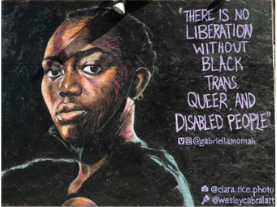
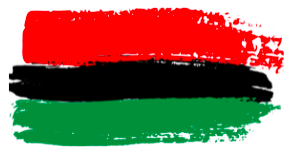 A Letter from Sylvia Spears on Juneteenth
A Letter from Sylvia Spears on Juneteenth
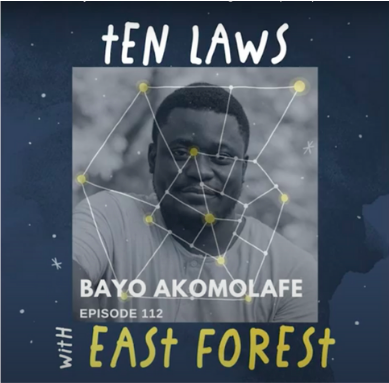 Ten Laws Podcast with East Forest, #112 with Bayo Akomolafe: Uncovering Bones
Ten Laws Podcast with East Forest, #112 with Bayo Akomolafe: Uncovering Bones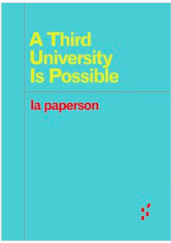
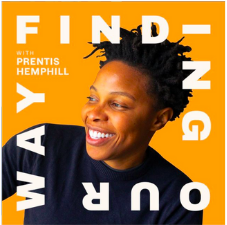 Finding Our Way Podcast, Season 2
Finding Our Way Podcast, Season 2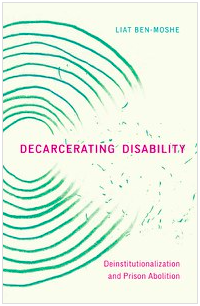
 Seed to Harvest: The Wooden Book, a touring book project where the people and communities write the pages, launched its Boston-area tour from Emerson’s Elma Lewis Center in April. Seed to Harvest: The Wooden Book is the first in a series of books that will travel throughout the United States and 14 U.S. territories collecting stories in the form of memories that will serve as medicine for its readers. In collaboration with Arts Emerson artist-in-residence, Toshi Reagon’s
Seed to Harvest: The Wooden Book, a touring book project where the people and communities write the pages, launched its Boston-area tour from Emerson’s Elma Lewis Center in April. Seed to Harvest: The Wooden Book is the first in a series of books that will travel throughout the United States and 14 U.S. territories collecting stories in the form of memories that will serve as medicine for its readers. In collaboration with Arts Emerson artist-in-residence, Toshi Reagon’s  Access, Equity, & Title IX
Access, Equity, & Title IX
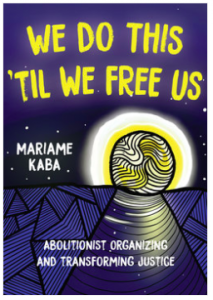 We Do This ‘Til We Free Us: Abolitionist Organizing and Transforming Justice by Mariame Kaba. What if social transformation and liberation isn’t about waiting for someone else to come along and save us? What if ordinary people have the power to collectively free ourselves? In this timely collection of essays and interviews, Mariame Kaba reflects on the deep work of abolition and transformative political struggle.
We Do This ‘Til We Free Us: Abolitionist Organizing and Transforming Justice by Mariame Kaba. What if social transformation and liberation isn’t about waiting for someone else to come along and save us? What if ordinary people have the power to collectively free ourselves? In this timely collection of essays and interviews, Mariame Kaba reflects on the deep work of abolition and transformative political struggle.
 Sorrowland by Rivers Solomon. A genre-bending work of Gothic fiction. Here, monsters aren’t just individuals, but entire nations. It is a searing, seminal book that marks the arrival of a bold, unignorable voice in American fiction.
Sorrowland by Rivers Solomon. A genre-bending work of Gothic fiction. Here, monsters aren’t just individuals, but entire nations. It is a searing, seminal book that marks the arrival of a bold, unignorable voice in American fiction.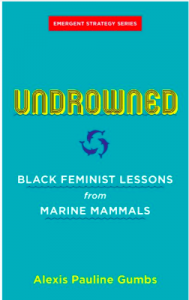 Undrowned: Black Feminist Lessons from Marine Mammals. Undrowned is a book-length meditation for the entire human species, based on the subversive and transformative lessons of marine mammals. Alexis Pauline Gumbs has spent hundreds of hours watching our aquatic cousins. She has found them to be queer, fierce, protective of each other, complex, shaped by conflict, and struggling to survive the extractive and militarized conditions humans have imposed on the ocean. Employing a brilliant mix of poetic sensibility, naturalist observation, and Black feminist insights, she translates their submerged wisdom to reveal what they might teach us. The result is a powerful work of creative nonfiction that produces not a specific agenda but an unfolding space for wonder and questioning.
Undrowned: Black Feminist Lessons from Marine Mammals. Undrowned is a book-length meditation for the entire human species, based on the subversive and transformative lessons of marine mammals. Alexis Pauline Gumbs has spent hundreds of hours watching our aquatic cousins. She has found them to be queer, fierce, protective of each other, complex, shaped by conflict, and struggling to survive the extractive and militarized conditions humans have imposed on the ocean. Employing a brilliant mix of poetic sensibility, naturalist observation, and Black feminist insights, she translates their submerged wisdom to reveal what they might teach us. The result is a powerful work of creative nonfiction that produces not a specific agenda but an unfolding space for wonder and questioning.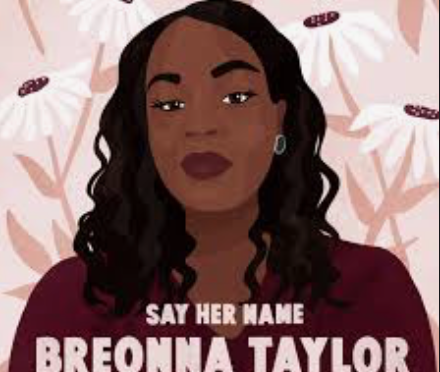
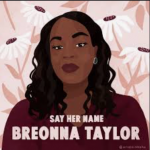 This community update was written before yesterday’s ruling by Attorney General, Daniel Cameron, regarding the indictment of officers involved in the shooting and death of Breonna Taylor. In many ways, the content of much of this newsletter feels out of sync with this moment and what some members of the Emerson Community may be feeling or needing in this moment. Regretfully, there is no measure of consolation that I can offer to sufficiently address the pain that some of us are experiencing today.
This community update was written before yesterday’s ruling by Attorney General, Daniel Cameron, regarding the indictment of officers involved in the shooting and death of Breonna Taylor. In many ways, the content of much of this newsletter feels out of sync with this moment and what some members of the Emerson Community may be feeling or needing in this moment. Regretfully, there is no measure of consolation that I can offer to sufficiently address the pain that some of us are experiencing today. The Panic & Patience Podcast series is hosted by Jae Williams, Director of Special Projects in the Social Justice Center. This series highlights the work of artists, educators, entrepreneurs, athletes, and community leaders as they explore issues affecting marginalized communities, and how we as leaders can create space and support efforts of change. “This is a space where Black and Brown folks can see themselves and their experiences reflected all of their inherit brilliance, fullness, and power,” said Sylvia Spears, Vice President for Equity & Social Justice. This series is anchored in an understanding that this work is an urgent ever-changing process of dismantling social constructs, unconscious bias, and systematic oppression, while also working to build for a future that encourages cultural humility, inclusion, and community growth. Panic & Patience is available on Apple Podcasts, Spotify, and Google Podcasts. Season One is available at Panic & Patience on Youtube. Feel free to check out Jae’s personal Panic & Patience website:
The Panic & Patience Podcast series is hosted by Jae Williams, Director of Special Projects in the Social Justice Center. This series highlights the work of artists, educators, entrepreneurs, athletes, and community leaders as they explore issues affecting marginalized communities, and how we as leaders can create space and support efforts of change. “This is a space where Black and Brown folks can see themselves and their experiences reflected all of their inherit brilliance, fullness, and power,” said Sylvia Spears, Vice President for Equity & Social Justice. This series is anchored in an understanding that this work is an urgent ever-changing process of dismantling social constructs, unconscious bias, and systematic oppression, while also working to build for a future that encourages cultural humility, inclusion, and community growth. Panic & Patience is available on Apple Podcasts, Spotify, and Google Podcasts. Season One is available at Panic & Patience on Youtube. Feel free to check out Jae’s personal Panic & Patience website: 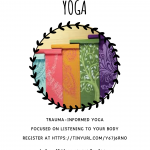 Trauma Informed Yoga
Trauma Informed Yoga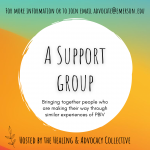 Support Group
Support Group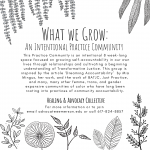 What We Grow: An Intentional Practice Community
What We Grow: An Intentional Practice Community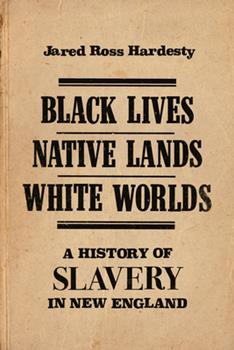 SERIES #
SERIES #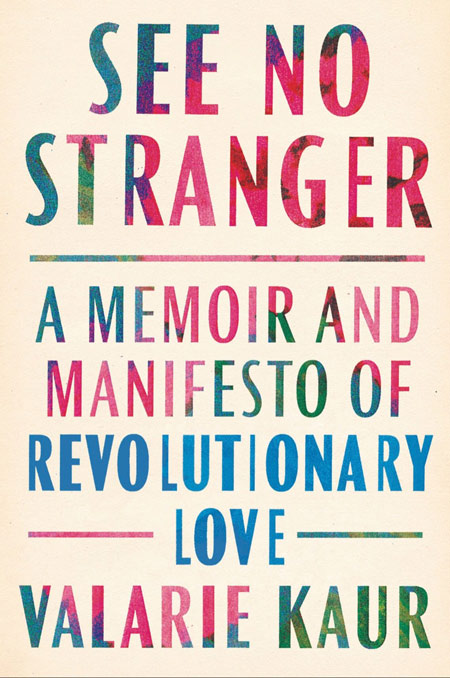
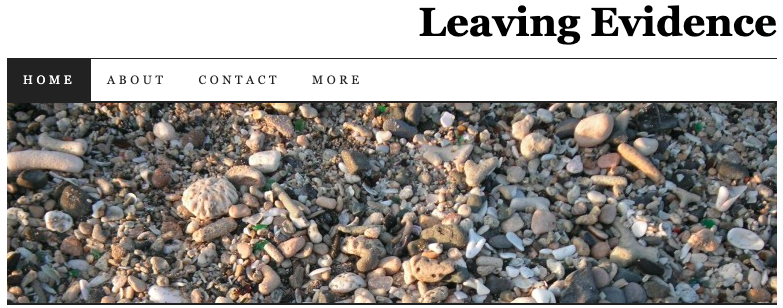 The Four Parts of Accountability: How To Give A Genuine Apology Part
The Four Parts of Accountability: How To Give A Genuine Apology Part 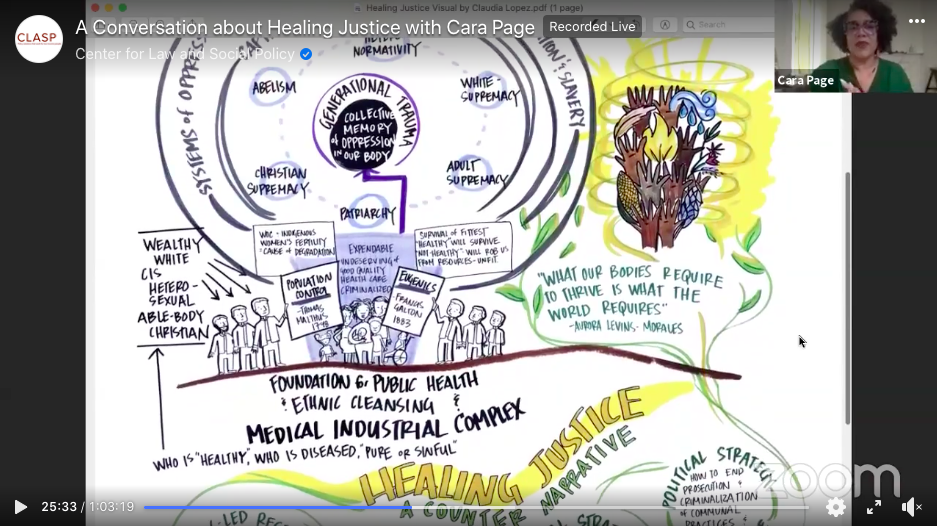 A Conversation About Healing Justice with Cara Page
A Conversation About Healing Justice with Cara Page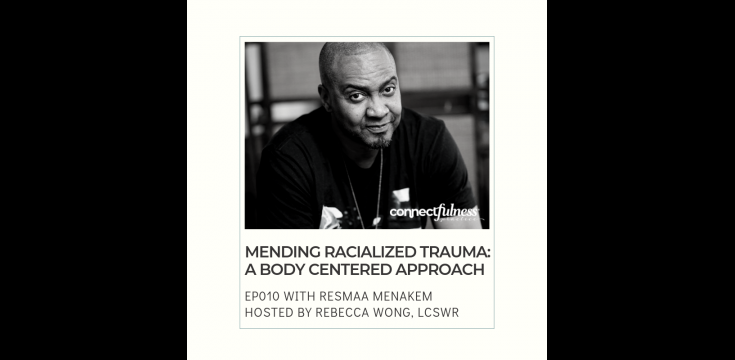 Connectfulness Podcast 010: Mending Racialized Trauma: A Body Centered Approach with Resmaa Menakem
Connectfulness Podcast 010: Mending Racialized Trauma: A Body Centered Approach with Resmaa Menakem The Deep by Rivers Solomon, with Daveed Diggs, William Hutson, and Jonathan Snipes
The Deep by Rivers Solomon, with Daveed Diggs, William Hutson, and Jonathan Snipes

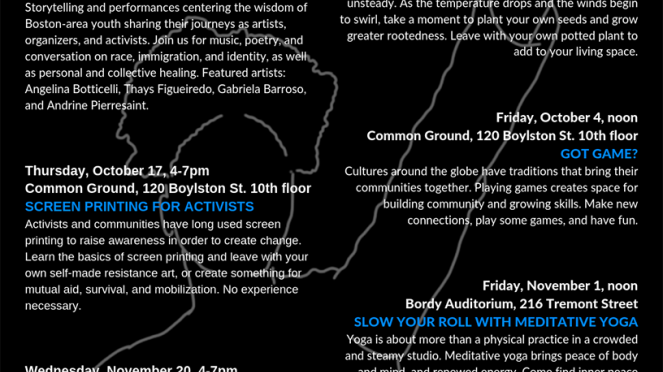
 Identity-based Harm (Bias, Micro-aggressions, and Structural Oppression)
Identity-based Harm (Bias, Micro-aggressions, and Structural Oppression)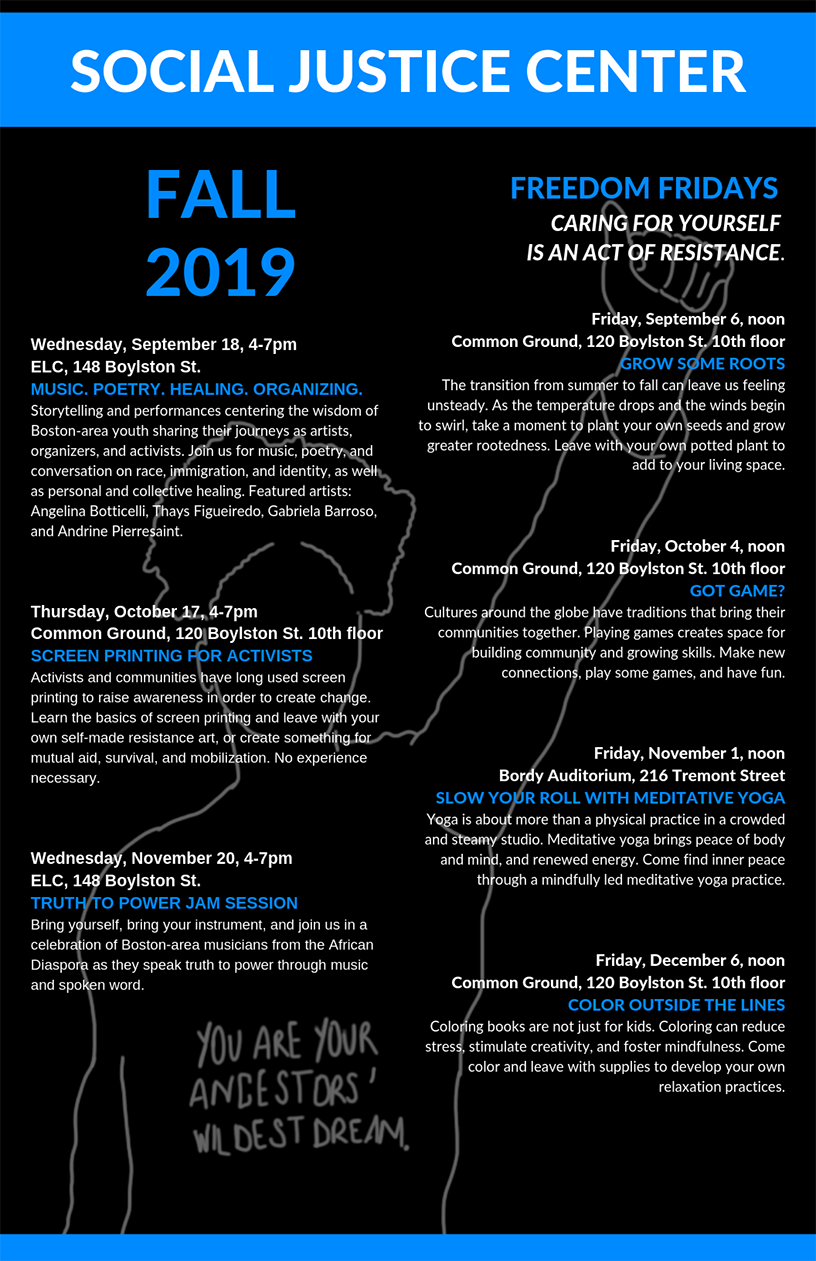
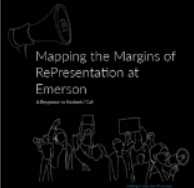
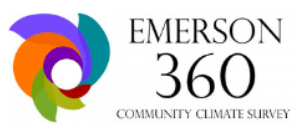 The Emerson360: Community Climate Student Survey, which focuses on student perceptions of general campus climate dimensions as well as topics related to power-based interpersonal violence, was administered during the fall semester. The survey had a 9% response rate, which is significantly lower than the response rate for the 2014 survey (32%). The following is a high-level summary of the findings from this year’s Emerson360: Student Survey.
The Emerson360: Community Climate Student Survey, which focuses on student perceptions of general campus climate dimensions as well as topics related to power-based interpersonal violence, was administered during the fall semester. The survey had a 9% response rate, which is significantly lower than the response rate for the 2014 survey (32%). The following is a high-level summary of the findings from this year’s Emerson360: Student Survey.
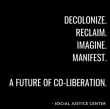

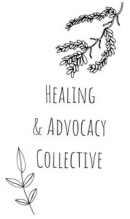 In reflection, we have considered whether our office names and titles align with our deepening values. This is especially important as we think about the incredible work that Melanie Matson and Greta Spoering do in support of our community, especially those who are impacted by power-based interpersonal violence. We seek to lift up and recognize the power of authentic relationships, the importance of trauma-informed practices, and the incredible strength of individuals and communities, as well as their extraordinary capacity to heal. In support of our community the Office of Violence Prevention & Response has become the Healing & Advocacy Collective—a space for being believed, a space where you can be yourself, and a space for healing.
In reflection, we have considered whether our office names and titles align with our deepening values. This is especially important as we think about the incredible work that Melanie Matson and Greta Spoering do in support of our community, especially those who are impacted by power-based interpersonal violence. We seek to lift up and recognize the power of authentic relationships, the importance of trauma-informed practices, and the incredible strength of individuals and communities, as well as their extraordinary capacity to heal. In support of our community the Office of Violence Prevention & Response has become the Healing & Advocacy Collective—a space for being believed, a space where you can be yourself, and a space for healing.